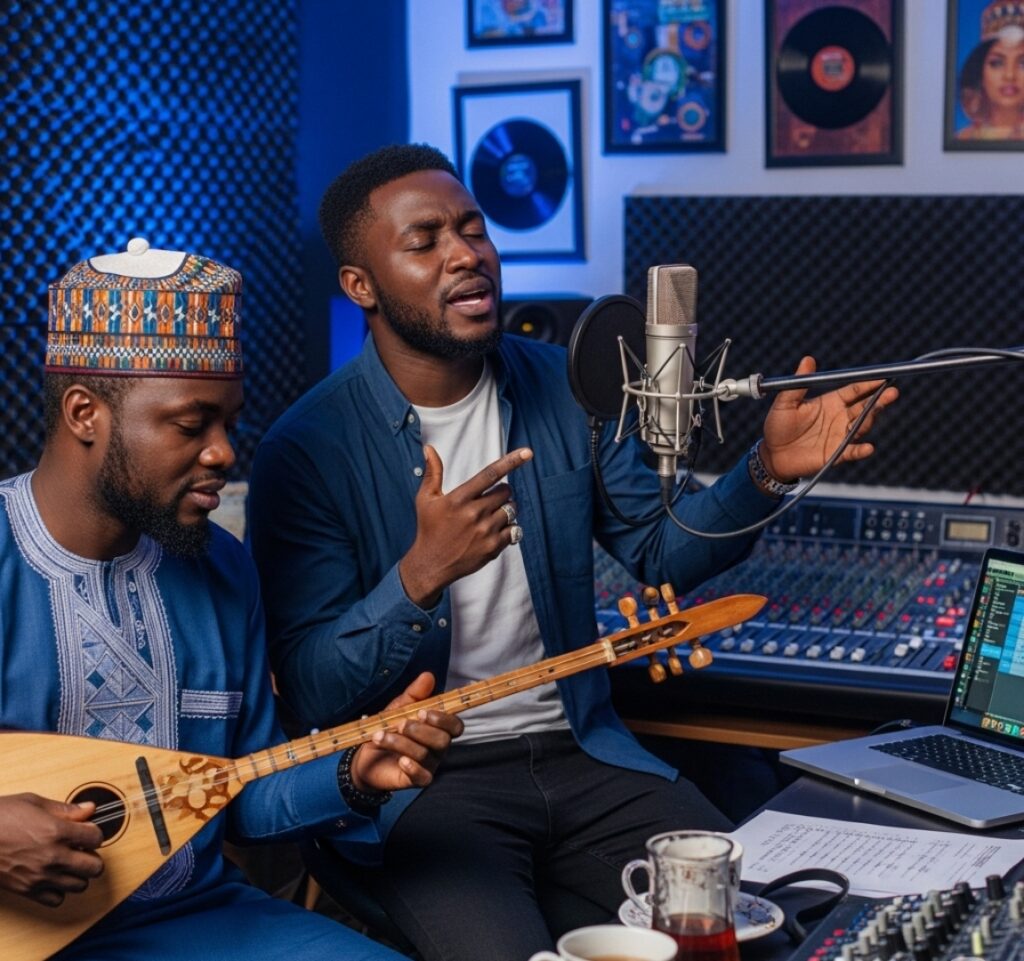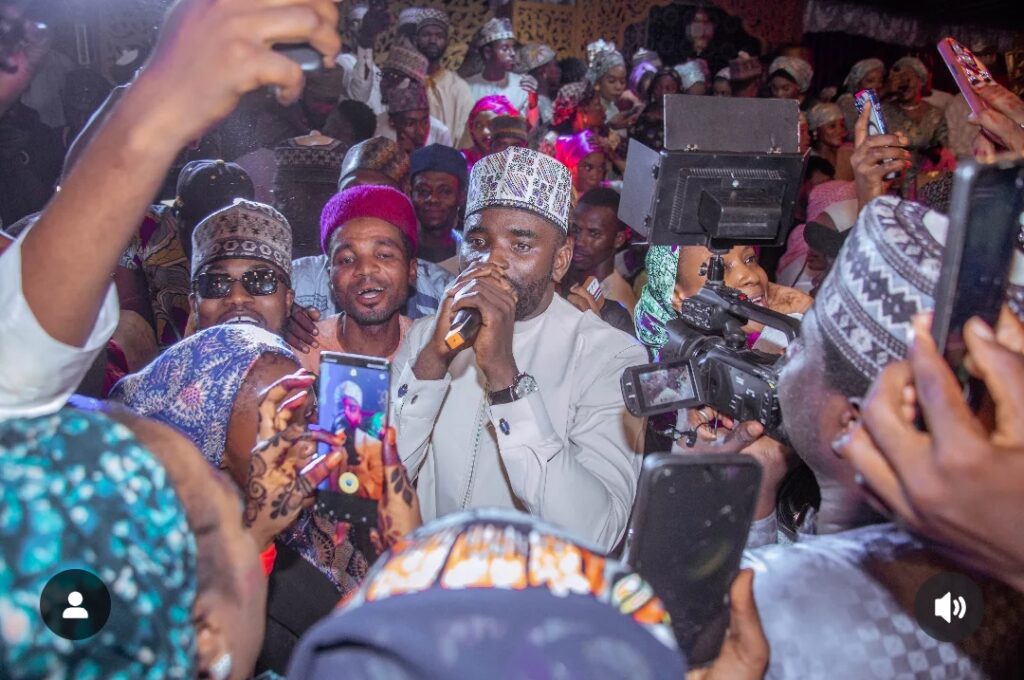You know, back in 2011, I still remember sneaking into a small CD shop in Sabon Gari, Kano, just to buy the latest Naziru Sarkin Waka album. You’d have to wait for the cassette or CD to drop, pray the shop had it, and then guard it like gold so your younger siblings wouldn’t scratch it.
Fast forward to today—no more waiting for weeks or trekking under hot sun. If your favorite Hausa artist drops a new track at midnight, you can stream it right there in your room with just your phone and data. Hausa music in the digital era has completely flipped the game, from how songs are made to how fans vibe with them.
In this post, we’re diving deep into how the internet, streaming platforms, and social media have transformed the Hausa music scene—and why this shift is more than just convenience; it’s a whole cultural evolution.

1. From Cassette & CD to Click & Stream
Let’s be honest—buying music used to be a hustle. Before the digital wave, Hausa music lovers relied on local marketers, physical CDs, or even Bluetooth sharing to get new songs. Now? Platforms like Boomplay, Audiomack, and YouTube have brought our favorite tunes to our fingertips.
Artists like Hamisu Breaker and Ali Jita now release singles directly online, cutting out middlemen and reaching fans worldwide instantly. It’s not just about ease—it’s about giving Hausa artists a global stage they never had before.
2. Social Media as the New “Radio”
In the old days, if you wanted your song to blow, you had to beg radio DJs or pay for airtime. Now, a single TikTok video can make a Hausa love song trend nationwide.
Take the case of Aisha, but realistic upcoming singer from Katsina. She posted a 15-second clip of her singing in her backyard. Within a week, the video hit 500,000 views, and her song landed on streaming charts—all without any radio play.
As one industry blogger, Malam Sule, told me:
“Social media is the new waka distribution market. If your song no trend online, na like say you never drop am.”
3. Cheaper & Faster Music Production
Before, recording an album in Kano or Kaduna could take months and cost a small fortune. Now, thanks to affordable recording software and home studios, even up-and-coming Hausa rappers can make quality tracks from their bedrooms.
This has birthed a wave of experimental genres—Hausa trap, Hausa R&B, and even EDM fused with traditional beats. Just look at how ClassiQ blends Arewa culture with modern hip-hop, all produced in digital studios.
4. Global Collaborations
Digital tech has removed borders. Hausa artists are now collaborating with Nigerian Afrobeats stars, Ghanaian rappers, and even UK-based producers.
For example, our star Mustapha “Young Arewa” Dan Musa collaborated with a London-based Hausa DJ on a remix. They never met physically—everything was done via email, Zoom calls, and file sharing.
5. Fan Culture Has Gone Interactive
Before, the only way to “talk” to your favorite Hausa singer was to see them at a concert or send a letter (and pray they read it). Now, fans can comment directly on Instagram lives, request songs on Twitter, or even join WhatsApp fan groups.
I spoke to Zainab, a die-hard Hamisu Breaker fan, who said:
“Before, artists dey like celebrity gods wey you no fit near. Now, if Hamisu post, I fit comment and he fit reply. E sweet die!”
6. Piracy Battles in the Digital Age
Even though streaming has reduced some piracy, illegal song downloads are still an issue. Many Hausa artists now fight this by releasing free teaser tracks, monetizing YouTube views, and partnering with official streaming services to protect their work.
Platforms like “Top Hausa Songs of 2025” are also helping fans find legit downloads.
7. The Cultural Impact
Beyond tech, the digital era has amplified Hausa cultural pride. Music videos now showcase traditional attire, Northern landscapes, and Hausa language in ways that reach non-Hausa audiences.
Songs like Ke Nake Gani have gone viral globally, introducing people to Hausa phrases and melodies. In a way, the internet has become a cultural export tool.

Actionable Insights / Takeaways
- Adapt or fade: Hausa artists must embrace streaming and social media or risk being left behind.
- Engage your fans: Replying to comments and sharing behind-the-scenes moments builds loyalty.
- Collaborate globally: The internet removes borders—use it.
- Protect your work: Fight piracy by using legit platforms and exclusive drops.
FAQs on Hausa Music in the Digital Era
What is the biggest change in Hausa music in the digital era?
Streaming platforms and social media have made it easier for artists to reach fans directly without middlemen.
How has social media helped Hausa artists?
It allows instant connection with fans, viral trends, and global visibility.
Can upcoming Hausa artists make money online?
Yes! Through streaming royalties, YouTube monetization, and brand sponsorships.
Is piracy still a problem?
Yes, but streaming and digital rights management are helping reduce it.
How has culture been preserved in this shift?
Music videos and online content now highlight Hausa traditions for a wider audience.
Call-to-Action
Which Hausa artist do you think is using the digital era best? Drop your thoughts in the comments and share this with a fellow music lover!